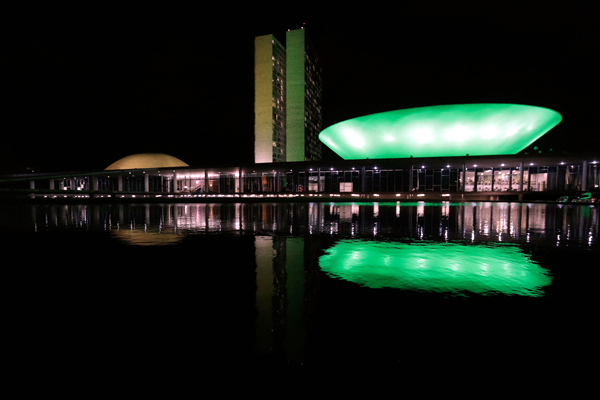Sneak preview: Brazil tops Argentina for World Cup

General view of the the Brazilian National Congress building, decorated with green and yellow light, the colors of Brazil, in honor of FIFA World Cup, in Brasilia, Brazil, Monday, June 2, 2014. AP
BRUSSELS— Maracana is filled to bursting for the World Cup final between Brazil and Argentina. If ever there’s home advantage, this is it.
The date? July 13, 2014, and Brazil doesn’t fail its fans, lifting the trophy.
Well, that’s how Brazil’s fanatic fans see the next six weeks unfurling.
Sixty-four years after a stunned home crowd watched its beloved team beaten 2-1 by another neighbor, Uruguay, in the World Cup decider, Brazil gets a second chance in 2014.
In between times, Brazil has become the standard in football, winning a record five titles. All of its stars have become global citizens, competing for the biggest clubs in the world, where they are exposed to stress and the toughest opposition on a weekly basis. The coach himself, Luiz Felipe Scolari, has been there before, leading the Selecao to their last World Cup in Yokohama in 2002.
All that experience matched with such skill was enough for victory.
Staring into the eyes of Brazil captain Thiago Silva at the toss was Lionel Messi, making Argentina the second part of the first all-South American final since 1950.
Messi had his own quest. Just like Diego Maradona, he needed a World Cup title to reach the ultimate accolade of greatness. Had he beaten Brazil, he would have been the first player to almost singlehandedly win the World Cup since Maradona did it in 1986.
Bent on redemption after being largely inconsequential at the 2010 World Cup, Messi’s pride carried him this far into the tournament. He came in with only one World Cup goal and added to that, but he failed to fully switch gears from a lackluster campaign with Barcelona to a sterling one with Argentina.
Did such a final mean that the continental pendulum had fully swung back South America’s way? Not really. Ever since the 1934 World Cup, European teams had at least half of the final four spots and it was no different here. The Old Continent was still there in the semifinals, with Germany and Spain.
Germany, though, came to the end of the line with its super-solid coach Joachim Loew. He finished in the top four in four attempts at major tournaments, a superb accomplishment for anyone. But when you are at the head of the mighty Mannschaft, titles are expected. Germany was done in by the weight of injuries this time.
With Sami Khedira barely back from a six-month layoff and three Bayern Munich veterans, including captain Philipp Lahm, struggling to get into World Cup form, it was all too much.
Injuries may heal, age cannot be fixed. And in the end it was the downfall of Spain. Xavi, 34, was a driving force as Spain won the 2008 and 2012 Euros and the 2010 World Cup, but another final was beyond reach. A lot of hope was vested in Diego Costa, but, even with horse placenta treatment, a muscle tear in his right leg made him a non-factor.
Injuries also turned a Latin American festival into a little less than that. Colombia was looking mighty good when Radamel Falcao was its leader and lethal striker. El Tigre underwent surgery on the anterior cruciate ligament in his left knee in January and started a race to get ready for the World Cup. Unfortunately, the world’s premier sports tournament has no soft spot for recovering stars.
And so it went, too, with Uruguay and its star Luis Suarez. The striker underwent knee surgery in the run-up to the World Cup and was unable to show the skills that earned him an English Premier League-leading 31 goals for Liverpool and the player of the year title.
But even healthy, it can be too much for one player alone to carry a team. Cristiano Ronaldo almost singlehandedly took Portugal to the World Cup with a sterling performance of skills and leadership in the playoffs against Sweden.
But when the best assets for Ronaldo are Joao Moutinho and Raul Meireles, it was just not enough magic to make the semifinals.
Instead, the surprise team was Belgium, with its mix of creativity from Eden Hazard and goalkeeping prowess of Thibaut Courtois.
That’s how it went. As predictable as football has always been.
Well, maybe.
On the morning of the decisive 1950 match in Rio, one Brazilian newpaper, O Mundo, already carried the title “We are the World Champions” and almost all fans in Brazil acted likewise for days. We all know what happened.
RELATED STORIES:
10 days before World Cup, a rush to finish stadiums
Spain gambles on Costa in 23-man World Cup squad